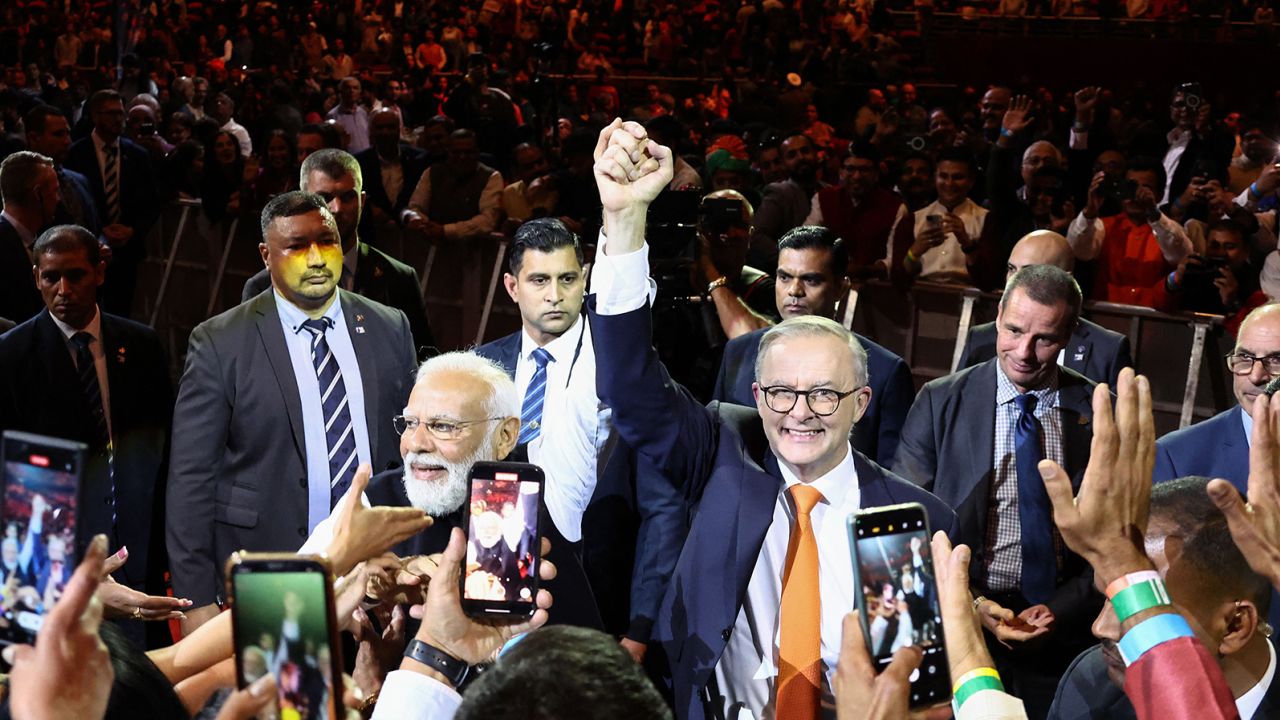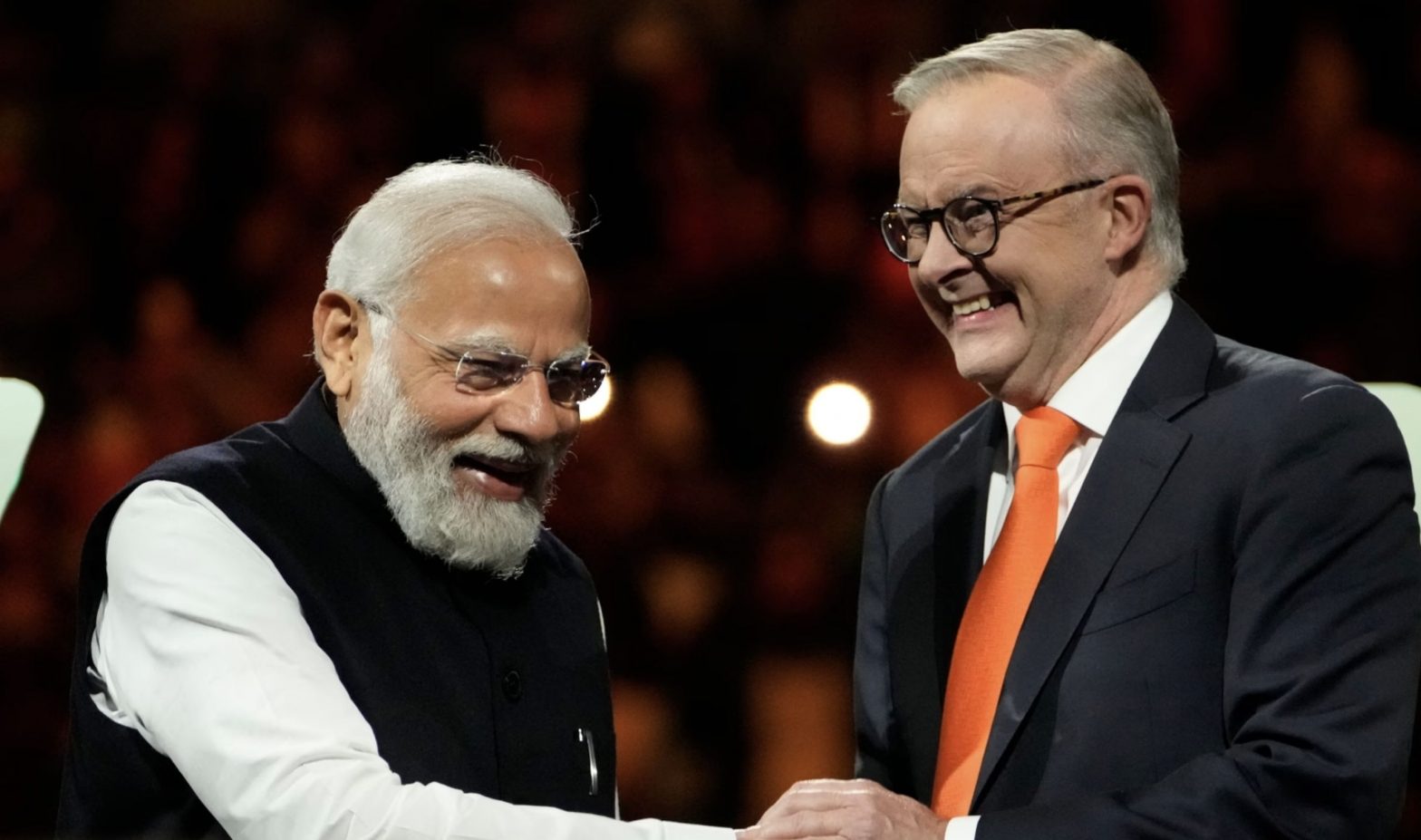In a remarkable demonstration of diplomatic camaraderie, Australian Prime Minister Anthony Albanese delivered a glowing tribute to his Indian counterpart, Narendra Modi, at a high-profile event held at Sydney’s Qudos Bank Arena on Tuesday. Drawing parallels between Modi and legendary American rock star Bruce Springsteen, Albanese’s enthusiastic introductory speech hailed the Indian leader as a transformative force and emphasized the strengthening bonds between Australia and India. Modi’s visit to Sydney, his first in nine years, comes at a crucial time as he gears up for the upcoming national elections in India, while Australia seeks to foster economic connections with the world’s most populous market amid strained relations with China.
Taking center stage as the emcee and warm-up act, Albanese set the tone for the evening, invoking the memory of Bruce Springsteen’s iconic performance at the same venue while suggesting that Modi’s reception surpassed even that of the revered musician. Praising Modi for bringing the spirit of India, the world’s largest democracy, to Australia, Albanese highlighted the Indian leader’s instrumental role in fortifying Australia’s democratic principles. The predominantly Indian diaspora audience responded with resounding applause, underscoring Modi’s immense popularity among Indians residing overseas.
Originally intended as a summit for leaders from the Quadrilateral Security Dialogue (Quad), which includes the United States and Japan, Modi’s visit to Australia carries added significance as Canberra seeks to strengthen its ties with New Delhi. Australia aims to enhance economic cooperation and solidify its strategic partnership with India as a counterbalance to an increasingly assertive China. Given the West’s interest in curbing China’s influence, collaboration with India becomes all the more pivotal.
During a joint appearance with Albanese, Modi employed a cricket metaphor, describing the ties between Australia and India as being in “T20 mode.” He emphasized the foundation of their relationship based on shared democratic values, while highlighting the role of the Indian community in Australia as a living bridge connecting the two nations. Modi also engaged with several prominent Australian figures during his visit, including renowned chef Sarah Todd and singer Guy Sebastian, as documented in videos shared on his Twitter account. These interactions showcased warm sentiments and admiration for the Indian leader.
Modi’s warm reception in Australia underscores his exceptional appeal among the Indian diaspora and his growing stature as a prominent global player. However, his tenure as Prime Minister, alongside his Hindu-nationalist Bharatiya Janata Party (BJP), has faced mounting criticism for curbing free speech and implementing policies allegedly discriminatory towards minority groups in India. Notably, Western leaders rarely address these concerns openly during Modi’s visits.
When questioned about addressing these issues, Albanese evaded a direct response, emphasizing his respectful relationship with Modi. While affirming Australia’s commitment to human rights, he acknowledged India’s accountability for its international relations and recognized its historical stance of non-alignment. Albanese commended India as a steadfast supporter of peace, security, and stability in the region.
Modi’s visit to Australia concludes a week of diplomatic engagements and travel, including meetings with leaders from Papua New Guinea and Ukraine. Furthermore, he is scheduled to be hosted by US President Joe Biden at the White House next month. These interactions hold great importance for Modi as India assumes the presidency of the Group of 20 (G20) this year, hosting significant events and positioning itself as a leader among Global South nations. With the 2024 election year approaching, Modi aims to secure a second decade in power, positioning India as an increasingly influential global player.

Despite the growing proximity between India and the West, critics accuse Western leaders of turning a blind eye to alleged human rights abuses within India. Recent incidents, such as the ban on a critical BBC documentary regarding Modi’s involvement in the Gujarat riots and the stripping of Rahul Gandhi’s lawmaker status, have garnered international attention. Critics argue that these cases are politically motivated and undermine India’s democratic credentials.
In a significant blow to Modi’s Bharatiya Janata Party (BJP), the party suffered defeat in its sole stronghold in southern India as Karnataka state voted in favor of the Congress Party, led by Rahul Gandhi. This outcome highlights the evolving political landscape in India and the challenges Modi faces in maintaining his party’s dominance.
As the world observes India’s rise and the evolving relationship with the West, it is essential that leaders be subject to both praise and scrutiny. The warmth and admiration displayed during Modi’s visit to Australia underscore the significance of bilateral ties while raising important questions about the delicate balance between diplomatic engagement and holding leaders accountable for human rights concerns.
In an increasingly interconnected world, leaders must navigate the complexities of international relations, economic cooperation, and advocacy for human rights. Only through open dialogue, mutual respect, and an unwavering commitment to democratic principles can nations forge a path towards a more inclusive and prosperous future.
©world-news.biz
